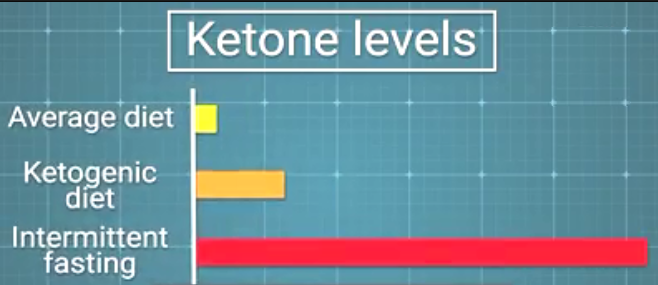How long has it been since you last ate?
People who fast intermittently often eat within an 8-hour block, leaving 16 hours of fasting in between.
During that 16-hour stretch their bodies undergo an important change that set them apart from non-faster.
Here is how it works.
When you eat, you store some of that energy in the liver as glycogen. But after 10-12 hours of not eating, your glycogen reserves will be extremely low. As a result,you may feel more irritable than normal.
A term scientist call "hungry". fat cells in your body release fats into your bloodstream. The fat cells head straight to your live, where they are converted to energy for your body and brain.
So, you are literally burning fat to survive. While the blood samples show that people who had fasted for 12-24 hours experienced a 60% increase in energy from fat, wit the biggest change occurring after 18 hours. This is the benefit to intermittent fasting because it puts you in a state called Ketosis.
And it's why researchers think intermittent fasting could be the key to a longer, healthier life.
Intermittent fasting provides one method of decreasing insulin, while also decreasing caloric intake.
Alzheimer’s disease (AD) is characterized by the abnormal accumulation of proteins. There are 2 main classes – amyloid plaques and neurofibrillary tangles (tau protein). The symptoms of AD correlate closely with the accumulation of these plaques and tangles. It is believed that these abnormal proteins destroy the synaptic connections in the memory and cognition areas of the brain.
Certain proteins (HSP-70) act to prevent damage and misfolding of the tau and amyloid proteins. In mouse models, alternate daily fasting increased the levels of HSP-70. Autophagy removes these tau and amyloid protein when they are damaged beyond repair. This process, too, is stimulated by fasting.
There is substantial evidence that risk of AD is related to obesity. A recent population based twin study demonstrated that weight gain in middle age predisposes to AD.
Taken together, this suggests a fascinating possibility in the prevention of Alzheimer’s disease. Over 5 million American have AD and this number will likely increase rapidly due to the aging population. AD creates significant burdens upon families that are forced to care for their afflicted members.
Certainly fasting may have significant benefits in reducing weight, type 2 diabetes along with its complications – eye damage, kidney disease, nerve damage, heart attacks, strokes, cancer. However, the possibility also exists that it may prevent the development of Alzheimer’s disease as well.
The method of protection may also have to do with autophagy – a cellular self cleansing process that may help removed damaged proteins from the body and brain. Since AD may result from the abnormal accumulation of Tau protein or amyloid protein, fasting may provide a unique opportunity to rid the body of these abnormal proteins. We will cover autophagy next week.
Source

KETONES
The process of burning fat releases chemicals is called ketones. In the brain, ketones trigger the release of an important molecule called BDNF.
BDNF(Brain-Derived Neurotrophic Factor) helps build and strengthen neurons and neural connections in areas of the brain responsible for learning and memory.
Which could explain why a boost in ketone production has been shown to improve memory in people with early signs of dementia in as soon as 6 weeks.
Increasing ketones in the body is also a common treatment for patients with severe epilepsy.
You don't necessarily have to fast to boost your ketone levels.
Introducing more fatty foods into your diet and cutting back on carbs can have a similar effect.
A group of people who tried this method for 3 months not only lost weight and body fat, but also saw a decrease in blood pressure and a hormone (IGF-1) that is related t aging and disease.
But scientist have discovered that fasting increases ketone levels more. ketogenic diets can increase ketones 4-fold whereas fasting has been shown to increase ketones by up to 24-fold.
As a result, fasting compared to a ketogenic diet may have a stronger more beneficial effect on overall health.
Yet many African and American who eat three meals a day with snacks in between never reach ketosis and therefore aren't producing enough ketones to promote good health.
fasting and Ketosis have been a key to our survival from the beginning.
1.They helped our ancient ancestors survive through bouts of starvation.
And today, they are becoming recognized as a way to help keep future generations, mentally and physically diseases-free.
Thanks for reading, please comment and contributions is allow

